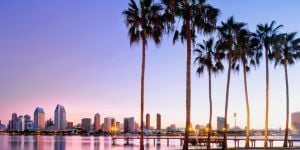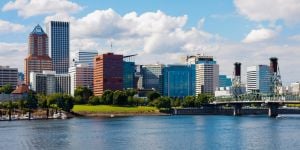
Since its beginnings as a gold rush boom town, San Francisco has been a dynamic, busy city where people go to try and make their mark. Famous for its tech sector, San Francisco is also a manufacturing town, a shipping and logistics hub, a financial centre, and a key destination for creatives and artists. Whatever your industry is, you're likely to find it represented in San Francisco, but you'll likely be competing with some very qualified candidates. We've put together a list of key things to bear in mind when starting your job search in The Golden City.
Popular industries in San Francisco
The tech sector in San Francisco is well known. And even though it's not the biggest contributor to the city's GDP (that title goes to manufacturing), it is the reason why many aspiring job seekers venture to this city. Hundreds of IT companies in San Francisco are present — including industry leaders like Salesforce, Apple, Google, Uber, and others. The list of start-ups in San Francisco to watch changes constantly, and the sector is defined by constant innovation, disruption, and flux. The area also has the highest concentration of research universities and federal research institutions in the country and is home to top-rated universities like Stanford and Berkeley, which pump out gifted graduates who are ready to make their mark.
Digital entertainment companies in San Francisco have made the city their base, including some of the biggest names in the industry, like YouTube, Zynga, Twitter, Dolby Laboratories, Pixar, Sony, and more.
The development of the biotech industry in San Francisco is also known for its substantial contribution to life science. Cleantech and environmental sectors are also well established here.
San Francisco is also an international trade centre and is the 10th largest exporting region in the country. It is also home to some of the major international bank branches, including HSBC,
Barclays Bank, Sumitomo Bank, Banque Nationale de Paris, and others.
While the city is buzzing with exciting work opportunities and career prospects — the competition is very tough. High salaries, good job prospects, and a nice, loving environment have made the city popular not only with locals — but also with expats.
Another thing to consider is the cost of living in San Francisco, which is quite high. Housing costs tend to be the biggest expense as rent prices in the city are two and a half times the national average.
Where to start your job search in San Francisco as an expat?
There are several ways to go about your job search in San Francisco.
Firstly, keep in mind that to receive a work visa to the United States, you need to have employer sponsorship before applying.
This means that you need to have a valid job offer from a company in San Francisco that is willing to sponsor your visa. The problem with this is that arranging a work visa for a foreigner to come to the United States is generally a rather long (up to six months) and costly process. Understandably, not many companies would have the resources to go through this process — which makes your options quite limited. This is why you should immediately indicate to your potential employer that you will need a work visa sponsorship so that you can evaluate the feasibility of the process.
You can start your job search in San Francisco by searching for companies in your home country with branch offices in SF. This makes for a much easier paperwork process as you will transfer to work in San Francisco instead of applying for a work visa from scratch.
Another option is to narrow down a list of companies in San Francisco that you would like to work for and send applications to their HR managers directly. Make sure your CV is well structured, and add a cover letter to explain your interest and motivation for the job. You can use online job hunting platforms and apply to companies in SF with your profile and CV.
Another way to get hired by a company in San Francisco and settle in the city is by studying there first. True, this is a much longer road to take — but it is one of the surest ways to get your career started. Student visas can be extended using Optional Practical Training (OPT), which is temporary employment that is directly related to an F-1 student's major area of study. OPT can last for two years and is a great way to get your foot in the door and secure a place in your chosen industry.
San Francisco is home to some of the top-rated universities in the United States and the world (like Stanford and Berkeley). Plus, you will not only be getting a prestigious degree from an American university but also networking opportunities during your time of study. During your studies, you may be able to find internship opportunities in San Francisco that lead to connections or a full-time offer.
Job hunting resources in San Francisco
There are lots of online and offline resources that can be helpful in your job search in San Francisco.
Online resources
The most obvious place to start your job search in the Bay Area is running a simple web search for job offers in your line of work. Additionally, run the exact search and include the phrase “visa sponsorship” — this can help you narrow the search down to the companies willing to sponsor a work visa.
Register and upload your CV to popular international job-hunting platforms like Careerbuilder.com or Monster.com. You can also set up alerts for when new job offers appear in your field.
Social media can also be helpful in your job hunt. Make sure to keep your portfolio on LinkedIn up-to-date and set alerts for job offers from companies in San Francisco. You could also indicate in your LinkedIn profile status that you are looking for new opportunities, specifically in San Francisco.
Joining expat job search groups on LinkedIn and other social networks can greatly help.
Headhunting agencies
If you are an experienced professional looking for a senior position, your best option may be to go through a recruitment agency. Some of these companies specialize in specific fields (engineering, IT, media, etc.), and you may be able to find one that has a good success record for placing professionals in your niche.
Career fairs
If you are already in San Francisco and are looking for new job opportunities, consider attending a career fair. These are an excellent way to get a foot in the door with some big employers as well as talk to recruiters face to face and make an impression.
To find out about upcoming career fairs in SF, check out the National Career Fairs website.
Contact employers directly
You can also contact employers directly with your CV and cover letter for job applications and inquire about available opportunities. Make sure to research the companies you are applying to so that you can highlight how you can be of help to them in your CV and cover letter.
How to write an American-style CV?
Before you start your job search, make sure your CV is complete, properly formatted, and up-to-date.
This is highly important for effective job hunting, and your resume can directly affect the success of your search.
Depending on the position you are applying for, you may want to include different information in your CV.
Consider the following points when crafting your American-style CV:
- Format: Choose a suitable format for your CV. Common options include listing work experience in reverse chronological order or focusing on your skillset instead of experience. You can also blend elements from both formats to create a hybrid CV.
- Header: At the top of your CV, include basic personal information like your name and contact details. Avoid including sensitive details such as gender, race, marital status, or religion unless directly relevant to the position you're applying for.
- Reason for applying: Optionally, include a statement explaining why you're applying for a specific position. Share your dedication to your work, career aspirations, and relevant work values.
- Work experience: Outline your work history, typically starting with your most recent employer. Include details such as company name, job title, responsibilities, and achievements. Consider starting with the position most closely related to the job you're applying for.
- Education: Provide information about your degrees (e.g., BA, MA) and relevant courses, certificates, seminars, or conferences that have contributed to your expertise. Recent graduates may prioritize their education section.
- Languages: Highlight any languages other than English that you speak, along with your language proficiency level (e.g., basic, conversational, fluent). Include any associated language certificates (e.g., TOEFL, IELTS, TOEIC).
- Computer skills: List your proficiency in various programs and applications, including word processing, database management, social media, etc.
- References: Include references from previous employers if requested in the job posting. Alternatively, offer to provide references upon request if not explicitly mentioned.
- Spell check: Proofread your CV and run it through a spell checker to eliminate spelling and punctuation errors that may deter potential employers.
- Readability: Present information clearly and concisely to enhance readability. Consider using a pre-designed template for a professional look and efficient formatting.
- Attachments: When contacting potential employers for the first time, typically send your CV and cover letter only. Include additional documents or attachments only if specifically requested in the job posting.
Crafting an effective American-style CV requires attention to detail and adherence to these guidelines, increasing your chances of making a positive impression on prospective employers.
How to craft a cover letter in San Francisco?
A well-crafted cover letter is a valuable companion to your CV and plays a crucial role in capturing the recruiter's interest. It provides an opportunity to showcase your side and your suitability for the job. Here's a step-by-step guide to creating an engaging cover letter:
Keep it concise and purposeful:
- A cover letter should be brief and directly to the point.
- Explain your interest in the job and why you are the ideal candidate for it.
Tailor each letter:
- While you can use a basic template, avoid recycling the same letter for different companies.
- Customize each cover letter to make it as specific as possible to the position you're applying for.
Follow this sample format:
- Header: Include the employer's address, your contact information, and the date.
- Salutation: Ideally, address the letter to the person who will be reading it. Research the company's webpage or LinkedIn page to find the HR manager's name. If that information is unavailable, use "Dear Hiring Manager" or "Dear [Company Name] Recruiter."
- Introduction: State the position you are applying for and how you learned about the job opening. Briefly explain why you believe you are a strong fit for the role. Make this section engaging to capture the recruiter's attention and stand out.
- Body: Provide a concise overview of your skills, qualifications, and relevant experience. You need not delve into extensive details, as this information is covered in your CV. Highlight your most pertinent experiences and significant achievements.
- Closing: Summarise the key points in your letter and express your anticipation of a response from the hiring manager.
- Signature: Conclude your letter with a closing phrase such as "Sincerely" followed by your name.
Creating a well-structured and personalized cover letter enhances your chances of making a positive impression on potential employers. Remember to keep it succinct, purposeful, and tailored to each specific job application.
Navigating the job interview process in San Francisco
Securing a job in San Francisco involves several steps, including interviews, whether in person or online. Here are some essential tips to help you prepare for a successful interview:
Company research
Thoroughly research the company you're applying to. Familiarize yourself with their mission, values, and culture. Understand what they stand for and what they expect from their employees.
Self-reflection
Before the interview, contemplate what you can bring to the team. Consider how your skills and experience align with the company's needs and objectives.
Documentation preparation
Gather all necessary documents, including your CV, degrees, and any other relevant certifications or credentials. Ensure these are readily accessible for reference.
Technical setup (for remote interviews)
If your interview is remote, ensure you have a stable internet connection. Verify that your microphone and webcam, if required, are in good working order.
Review your CV
Reacquaint yourself with your CV before the interview. This will help you respond promptly and confidently to any questions related to your resume.
Prepare questions
Create a list of thoughtful questions for your potential employer. This demonstrates your genuine interest in the company and the role you're pursuing.
Clarify the next steps
Towards the end of the interview, inquire about the next steps in the hiring process. Ask about the expected timeline for communication and whether additional information or documentation is required.
Reminder: To work legally in the United States, you must obtain a work visa before commencing employment. Entering the country under pretences, such as on a tourist or family visa, and subsequently seeking work is against immigration laws.
While job hunting in San Francisco may seem complex, it's a rewarding endeavour if done with the right approach. By equipping yourself with the necessary tools, maintaining a positive attitude, and conducting thorough research, you can pave the way to getting a job in the city of your dreams.
For more information on San Francisco, check out more articles in the San Francisco guide.
Useful links:
We do our best to provide accurate and up to date information. However, if you have noticed any inaccuracies in this article, please let us know in the comments section below.












Comments